Part 28: Dissolution of the United Kingdoms
Chapter 28 – The Fall of the United Kingdoms of Iberia – 1414 to 1422The fifteenth century was still young, but from Delhi to Lisbuna, armies were clashing and wars were raging. In the eastern Mediterranean, the two major powers dominating the stage were the Despotate of Nicaea and the Sultanate of Armenia, constantly embroiled in conflict.
Late in 1414, however, the Iconoclast faithful managed to crush the Sunni power in a decisive battle outside Antioch. In the ensuing peace treaty, they demanded Cilicia and large amounts of tribute in return for peace, humiliating the young and self-proclaimed caliphate.

Meanwhile, further west, the powerful Kingdom of France was also on the offensive. After observing the chaos in Iberia with interest for years now, King Frederi finally opted to declare war for the strategic island of Sardinia, hoping to expand his influence in the Mediterranean.

And in Qadis, almost absolute power was concentrated on a single person: Ali Ghizvanni. The Grand Vizier had humble origins as a merchant and tradesman, but by the early years of the fifteen century he had risen to become the richest man in the West, with his galleys monopolising the flow of trade between Asia and Europe. The vizier had poured vast sums of this wealth into his ambitions - buying political influence and exacting promises, purchasing vast estates in Salamanqa and Plasencia, and most importantly, funding the many wars between Al Andalus and Christendom.
Whilst Ali was warring against the forces of Christian Iberia and France, his young charge in Sayf Jizrunid was left to be raised by tutors and clergymen.

Ali himself spent most of the time with his army, which consisted of a conglomerate of Andalusi levies and Berber mercenaries. Al Andalus had already spent the past decade mired in civil conflicts and defensive wars, but in January of 1415, the Grand Vizier finally felt confident enough to go on the offensive again.
The Andalusi army marched northeast first, engaging the Occitans near Castelló, a powerful fortress straddling the border between Al Andalus and Aragon.


The Occitan army was tired and numerically inferior, so there was never any doubt as to who would come out on top. After a few hours of fighting, the Christians were finally broken and thrown back, bringing the Occitan invasion to an abrupt end.

The Andalusi took minimal losses, so Grand Vizier Ali marched the army westward as quickly as possible, hoping to repel the Castilians before they could capture any holdings.
He engaged a small force besieging Tulaytullah just as summer arrived, but the battle was quickly reinforced by a much larger Christian force, numbering more than 20,000 levies.

This time, the battle was long and bloody, with thousands on falling on both sides. The entire war pivoted on this single battle, however, so neither side were willing to retreat until they were utterly broken.
Thousands of levies and dozens of commanders were killed on both sides, but eventually, the elite Mubazirun unit managed to crush the enemy cavalry and outflank their army, crushing it in on either side in a devastating pincer manoeuvre. Before they knew what had hit them, the Christians were throwing their swords to the dust and dropping to their knees.


King Pol hastily pulled the remnants of his host back, with his broken army fleeing in disarray. The Andalusi didn’t pursue them into enemy territory, however, manpower was precious and had to be conserved, so Grand Vizier Ali shifted to a defensive strategy instead.
Predictably, the Christians were back before the year was out, laying siege to the small town of Pedregal late in November. The Andalusi pounced without delay.


And once again, the Christians were annihilated. His prospects growing bleaker with every passing day, King Pol agreed to meet with Grand Vizier Ali for peace talks, eventually agreeing to concede defeat and pay heavy tribute in return for peace.

Unfortunately, however, bad news soon followed. Word arrived in Qadis of several French victories in Sardinia, where the rebels were utterly crushed over a series of short battles, allowing King Frederi to capture the entire island with absurd ease.
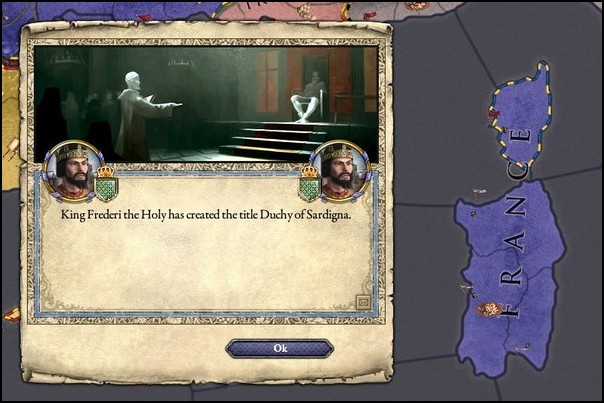
Nevertheless, with the surrender of Christian Iberia, two of the three wars had been brought to an end, and both in victory. From Tulaytullah to Qadis, country-wide celebrations were being conducted in honour of Grand Vizier Ali, but there was still one more enemy to defeat...
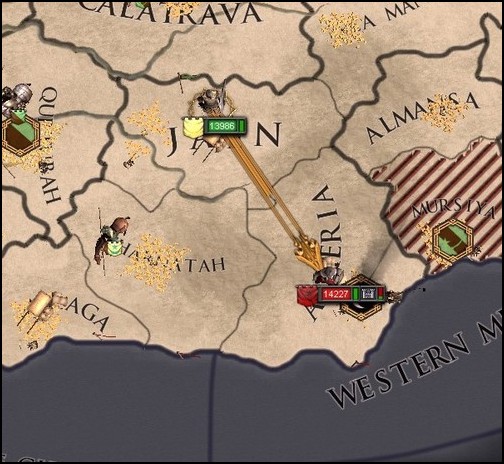
Emir Abdul-Razzaq, the grandson of Raf Jizrunid and great-grandson of Ayyub Sayfullah, had landed with a powerful host at Balansiyyah. From there, the determined commander pushed south and besieged Almeria, and this is where Grand Vizier Ali fell on him with 15,000 seasoned soldiers.
Once again, the battle quickly descended into yet another bloodbath, but after several hours of bloody fighting and considerable casualties on both sides, the rebels finally cut their losses and fell back.
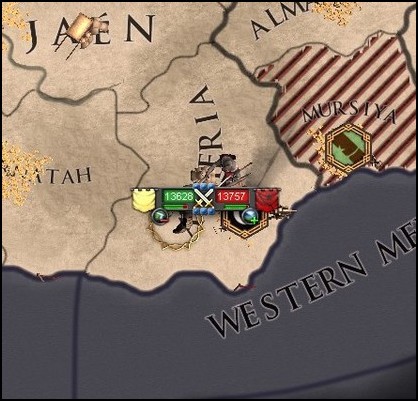
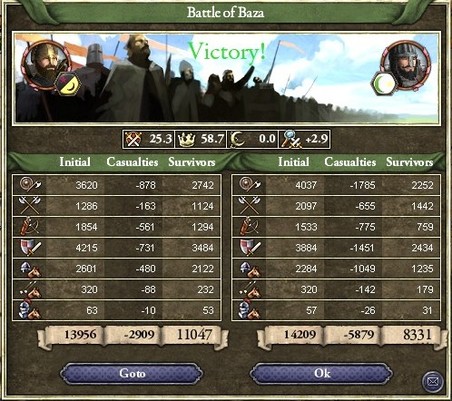
The victory wasn’t decisive, however, and Emir Abdul-Razzaq refused to surrender, escaping across the Mediterranean and back to Palermo to raise another host. After recapturing the fortress at Mursiya, Grand Vizier Ali loaded his men onto hastily-constructed transport ships, and pursued the rebels back to Sicily itself.
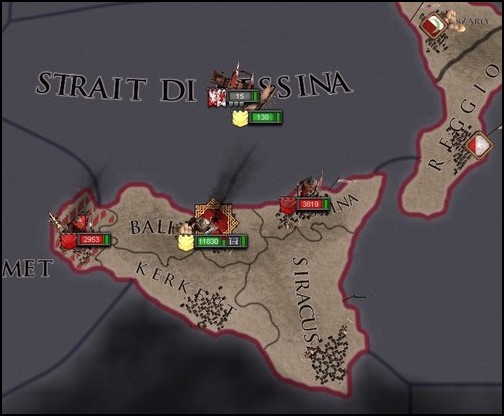
Initially, it looked like the campaign would be simple enough, with the only nearby hostile army numbering just 3000. As it turns out, however, the Emir of Palermo had a few surprises up his sleeve…
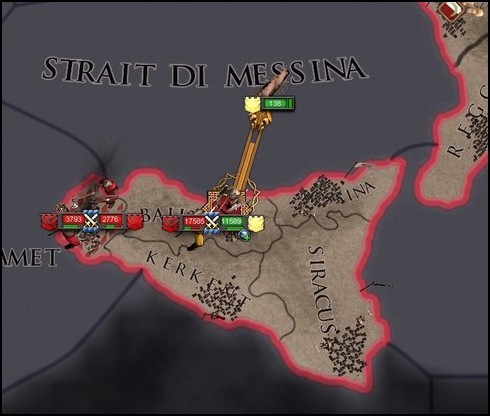
Using his vast gold reserves, Emir Abdul-Razzaq recruited a 15,000-strong Italian mercenary force, which he marched straight into the loyalist army. Grand Vizier Ali attempted a hasty retreat, but the rebels pinned him down before his entire army could embark.
The Andalusi didn’t fold easily, but once surrounded by the rebels, there was simply no chance of a victory. After three hours of thick fighting, the loyalists finally broke and retreated in disarray, closely pursued by the rebels.
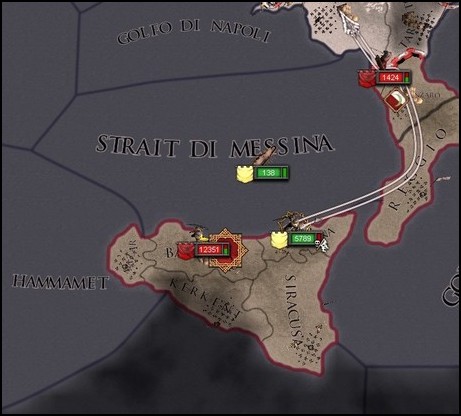
After being crushed in another engagement, Grand Vizier Ali was forced to the negotiating table, he would not be able to salvage another victory. Emir Abdul-Razzaq’s terms were harsh – full secession from Al Andalus, as well as vast sums of gold and treasure – but such was the price of defeat on the battlefield.

Ali returned to Qadis with a shell of an army, the kingdom teetering on the edge of bankruptcy, and half the Majlis ready to rise up against him. But he had done his duty, and after decades of constant warfare, Al Andalus was in peace once more.
And, as it turns out, the timing was perfect. Sayf came of age just weeks later, and after a short ceremony, was formally crowned as Sultan of Al Andalus. A shy, softhearted young man who held the word of Allah dear, he is precisely the leader that the crippled, war-weary Sultanate of Al Andalus needed just then.
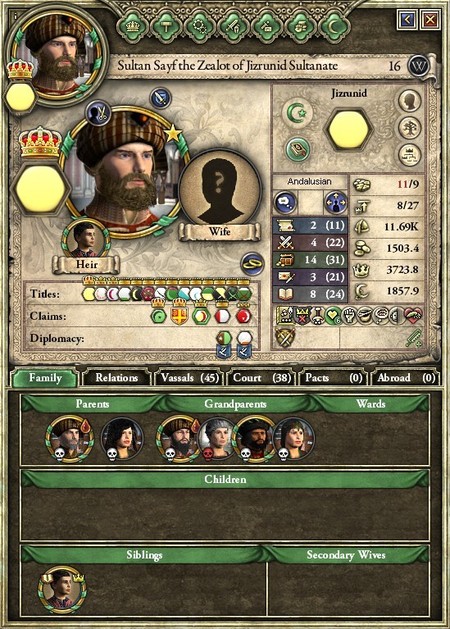
As Muslim Iberia enters a rare era of peace, the rest of the world continues to seethe and fume. To the immediate north, the once-powerful Kingdom of Castille had erupted into civil war after the disastrous loss to Al Andalus, with half a dozen principalities rising up in revolt against Burgos. Powerful dukes crowned themselves kings in Portugal and Galicia, the unruly lords of Navarra seized their independence, and the sons of Cyneric reclaimed their father's hard-won kingdom - at long last, the united kingdoms of Christian Iberia had fractured.
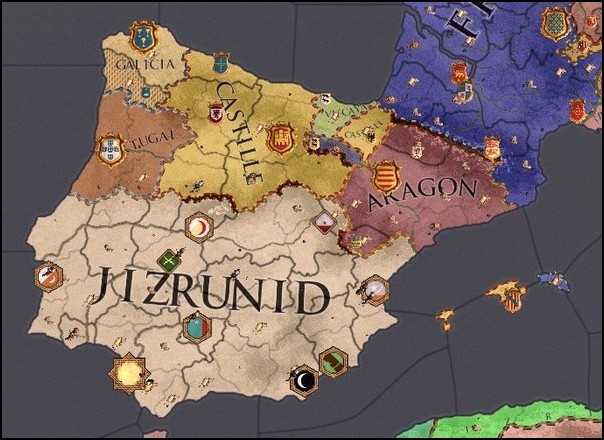
Meanwhile, in the Levant, the balance of power is once again transformed as the Shia Fatimid Caliph inherited vast tracts of land from his relatives in Syria.
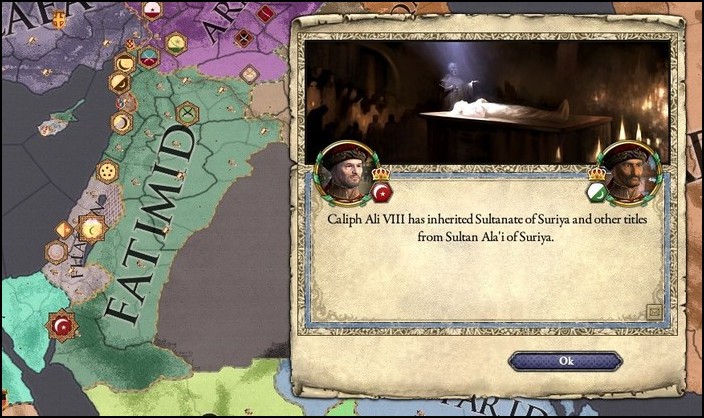
Posing the greatest danger to the recent victories of Islam, however, is the heart of Christendom itself - Rome. Late in the summer of 1424, Pope Callistus calls a Crusade against the Emirate of Palermo, marching tens of thousands down the length of Italy to engage the heathens.
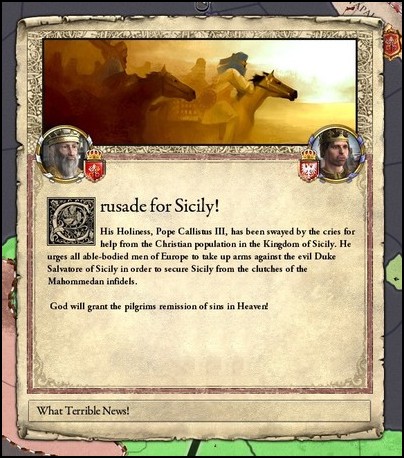
Very few actually answer the Pope’s call for war, however, with the various Christian powers too absorbed in their own struggles. The Celts and the English contend for primacy in the British Isles, border conflicts once again send France and the Holy Roman Empire towards war, the Balkans are divided between dozens of feuding princedoms, whilst the East has become the battlefield whereupon Christendom and Islam clash…
Whatever the outcome of the Crusade, it cannot be denied that the end of an age is fast approaching.